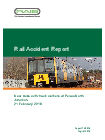The UK-Southern African Economic Partnership Agreement is a key element of a package of measures to boost African growth outlined by the Prime Minister, who highlighted that Africa’s long-term success matters to the UK, so it is in the world’s interest to help secure African jobs and growth.
Trade Minister George Hollingbery, who is joining Theresa May for her Africa visit, met with his counterpart from Botswana, who represented the trade ministers from the five Southern African Customs Union countries (South Africa, Botswana, Lesotho, Namibia and Eswatini (Swaziland)) and Mozambique.
Today in Cape Town, Minister Hollingbery and Minister Kenewendo signed a joint statement confirming that our trade agreement will be ready to enter into force as soon as the EU deal no longer applies to the UK. This means that UK consumers will be able to continue to enjoy Southern African wine, tea and fruits, among other popular goods, helping to support Southern African producers and exporters.
Further, UK businesses will continue to be able export goods including cars, motor parts and pharmaceutical products into Southern African economies – the overall trading relationship between the UK and these countries is worth nearly £10 billion annually.
This is one part of a package of trade measures to bring the transformative power of private sector trade and investment from the UK to Africa, a continent that is home to 16% of the world’s people but just 3% foreign direct investment and 3% cent of global goods trade.
Other measures, which are all part of the UK’s new and distinctive offer to work alongside, invest in, and partner with African nations for our mutual benefit, include:
- The UK Government has made an extra £5.5 billion in support from UK Export Finance available to 8 markets across Africa, supporting UK-Africa trade. This includes Algeria, Benin, Burkina Faso, Cote d’Ivoire, Mauritius, Morocco, Senegal and Tunisia.
- This announcement follows substantial increases to UK Export Finance’s appetite for 10 African markets over the last 18 months, as well as the introduction of support in 16 African countries.
- A new Prosperity Fund programme of up to £8 million will support implementation of the new UK-Southern African Economic Partnership Agreement. The funding will increase trade with and within Southern Africa by helping to remove barriers to trade, and in doing so expand import and export opportunities for UK and African businesses.
Trade Minister George Hollingbery said:
This week’s visit with the Prime Minister has highlighted the importance of the UK increasing trade with our partners in Southern Africa, through transitioning existing trade arrangements, supporting exporters and reducing barriers to trade.
Our trade relationship with the region is already worth £10 billion, and trade is a key driver of economic growth for both Southern Africa and the UK and will support UK producers and value chains, as well opening up new markets for UK exporters.
Today’s announcement is the most advanced statement of progress to date with around 40 existing EU trade agreements that the UK is transitioning, and an important step in positioning the UK as a global champion of free trade and development.
Strengthening our partnerships with Southern African nations demonstrates that the UK is committed to deepening our relationships across the world as part of our Global Britain vision.
About UK Export Finance:
- UK Export Finance, the UK’s export credit agency, provides export finance support, to ensure no viable export fails due to lack of finance or insurance from the private sector.
- This support can take the form of loans, guarantees and insurance to help UK exporters win, fulfill and get paid for exports, and offer their overseas buyers attractive financing terms alongside high-quality goods and services.
Link: Press release: UK-Southern African trade: boosting UK and African economies
Source: Gov Press Releases


